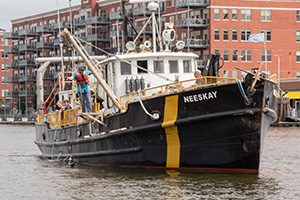UWM’s School of Freshwater Sciences is a partner in a new research institute focused on sustainable management of the Great Lakes.
The Cooperative Institute for Great Lakes Research represents a partnership between nine universities across the Great Lakes region, plus nongovernmental organizations and private businesses. CIGLR is led by the University of Michigan and funded with a five-year, $20 million grant from the National Oceanic and Atmospheric Administration.

UWM scientists have a longstanding history of collaborative Great Lakes research on topics such as invasive species, harmful algal blooms, and weather and climate.
“Restoring and protecting the Great Lakes is one of our generation’s greatest challenges,” said Val Klump, dean of the School of Freshwater Sciences. “This is a vast and rapidly changing system. It takes the efforts researchers from all across the basin to tackle these challenges and to ensure that the actions we take today will accrue long-lasting benefits to our environment, our economy and our quality of life.”
The grant is especially welcome news because previous sources of long-term funding for Great Lakes protection are in jeopardy, said Bradley Cardinale, director of the new institute and an ecologist at the University of Michigan.
“We are going to expand our research to be more interdisciplinary – in particular, adding social sciences that help us better account for human needs, desires and behaviors in the Great Lakes,” Cardinale said.
The Great Lakes comprise the single largest source of freshwater on the planet, representing 90 percent of freshwater in the United States. And 40 million residents in the United States and Canada rely on the Great Lakes for drinking water.
Other academic partners include Central Michigan University, Cornell University, Grand Valley State University, Michigan State University, Ohio State University, the University of Minnesota-Duluth and the University of Windsor.





